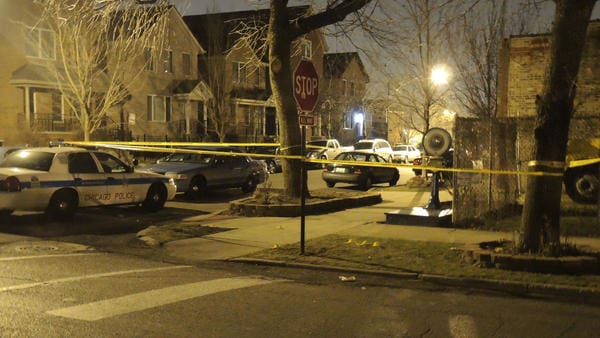By Steve Adcock
It’s tough to watch the evening news, read the papers, browse virtually any news-related web site or listen to career politicians these days and come away with any impression other than that crime is on the increase. The more consistent the story is put out there, the more likely the people are to believe it. And naturally when people fear crime they are more apt to submit to government-mandated controls over their liberties and freedoms to combat the violence they’re hearing tell of. It’s true, the majority of people today believe that crime is on the increase. According to a Gallup poll, 68% of those questioned believe that crime is worse today than a year ago, but it’s not. In fact, crime has steadily decreased since the mid 1990s . . .
This data isn’t exactly a secret. The FBI routinely publishes crime statistics and crime throughout the country has been decreasing for decades. In 2010, the FBI announced that crime nationally had dipped to a 40-year low. And not only has violent crime in general fallen, but violent crime in schools has decreased as well, not that you’d know that in the aftermath of Newtown. According to the government’s own numbers, crime has fallen a whopping 65% since 1993.
The wall-to-wall coverage of crime from our nation’s media and career politicians would certainly have you believe the opposite is true. Gun control is hot and politicians are taking advantage of highly publicized crimes to build the necessary fear among the population to encourage people to swallow additional breaches of their freedom. If kids are afraid to go to school or walk the streets, government must do something. Violence must stop and according to President Obama, the government needs to act now.
According to the government’s own numbers, though, it doesn’t.
“The fear of crime is ever-present, even when crime isn’t,” wrote Radley Balko in a Huffington Post report published last year. ”I’m sure the cable news obsession with sensational crime stories and the emergence of tragedy vultures like Nancy Grace have a lot to do with it. Long-developing trends like the crime drop by definition aren’t daily news. Crime is, even when it’s down.”
People’s fear of crime is a threat to their own liberty, to all of our liberties as American citizens. When people willingly give up freedoms like the right to keep and bear arms in exchange for the promise of more security, we quickly begin to tip the scales of freedom and control in favor of the state. Public perception is a powerful tool and when used carefully by authorities can produce seriously threatening results.
Staying vigilant and questioning the “official story” is the key to resisting the media’s and the state’s attempts to restrict or remove more freedoms from the American people. The numbers are out there. The facts are known. All the people have to do is look. Stop believing everything you’re told.
The government and their media cheerleaders know that emotions are the primary driver for most people. Bad news sells, and they provide a nearly endless supply. Watch 10 minutes of the Sandy Hook massacre and your heart sinks straight out of your chest. Columbine, Virginia Tech, the Gabrielle Giffords shooting – all of these incidents are tragic. Americans are naturally affected by them. Any sane person would be.
The problem is our political class know this all too well and these images are used to tug once again at the public’s heartstrings and generate a sense of fear. Those powerful emotions can quickly subsume the human psyche. It’s the perfect mechanism to influence public opinion. History clearly shows this and when governments toy with the emotions of the people, rarely is it for the benefit of the people. Cui bono? That’s right, it’s the government. It always is.
Steve Adcock is publisher of smallgovtimes.com.





The longer you go without being a victim of crime, the greater your chances of being a victim of crime.
Not statistically accurate, but accurate for how most people understand statistics.
“The longer you go without being a victim of crime, the greater your chances of being a victim of crime.”
That’s an example of the classic gambler’s fallacy.
As you imply, the longer you go without becoming the victim of a crime, the odds that you will become a victim at least once in your life go down (assuming the crime rate at least stays flat).
Not true. Unless there is a relationship between being a victim in the past and in the future (e.g. a victim who makes crime prevention lifestyle changes), the previous crime has no effect on future probability. Muggers don’t look you up in a database to see if you’re due for a mugging.
If anything, the opposite is true. People whose circumstances make them more likely to be crime victims (residents of poor neighborhoods, liquor store clerks, etc.) are more likely to get hit again and again.
Yeah, whatever the aggregate stats say, the odds of each individual becoming a victim depend in large part on the decisions they make, as always. So, it comes back to: don’t do stupid things with stupid people in stupid places.
“The longer you go without being a victim of crime, the greater your chances of being a victim of crime.”
Simply not true, as others have explained.
Y’all should read the second paragraph.
I explained this before. The probability of being a crime victim is cumulative. Assume that the probability of being a crime victim is independent from to year to year and is constant. (Although it works with variable probabilities as well but the series is more complicated to write out.
The probability of being a victim is P in and given year. For the first year the probability of remaining crime free is 1-P. In year two the probability of not being a crime victim remains 1-P. Therefore the probability of being crime free for two years in row is (1-P)*(1-P) or (1-P)^2. The probability of remaining crime free for three years is (1-P)^2*(1-P) or (1-P)^3. The probability of remaining crime free for N years is (1-P)^(N-1)*(1-P) or (1-P)^N. –> the probability of being a crime victim in N years is
1-(1-P)^N. This follows a binomial probability distribution. You can pick an N and graph out the cumulative probability distribution. You can also play with the FBI for your community and calculate the probability that you will be a crime victim for n=1,2,3…N years.
So, we say that video games and movies don’t influence people to violence but at the same time we say news reports influence people to believe crime and violence is on the uptick?
You’re comparing apples to tangerines, jwm. Media is a heavy influencer of beliefs. That’s why propaganda is so loved by dictatorships everywhere. Entertainment, like video games and movies, is a weak influencer of behavior.
yes, Ralph, you have it right again.
Well said.
The NYT and CNN wouldn’t lie to us to support ulterior motives or to sell more ads!
am i reading the data wrong, or is the FBI actually saying in their prelim numbers that crime went up last year?
By a small percent. If you look at the overall trend back to 1992, there have been several small upticks despite an overall downward trend. These kinds of data seldom trend monotonically one way or another.
Geez, Ben-I haven’t heard that term since I almost washed out of stats class decades ago. . .
Sorry if I dredged up bad memories 🙂
Monotonically. M-o-n-o-t-o-n-i-c-a-l-l-y. I enjoy this word.
I haven’t seen the actual numbers, but the uptick might not even be statistically significant.
“Staying vigilant and questioning the “official story” is the key to resisting the media’s and the state’s attempts…”
Used to be that the media drove the whole “questioning the official story” thing. It was, in many ways, a real government watchdog, and investigative journalists would dig into the govt’s official stories and strive to expose anything that wasn’t what it seemed. Today it’s certainly different, with the vast majority of the media acting as nothing more than outlets for the govt’s own official story; actively pushing the story and even covering up or not mentioning anything that flies in its face. The leftists who relied once on the media for holding the gov’t to account are now the ones wanting to burn down Fox News for not following in lock step, and the ones who are now pushing for a police state after decades of being the main group rallying against the police. Crazy world.
Those media outlets of old were independent papers competing for customers in a free marketplace. Now the news industry is under the control of a few key players. Many of those people and companies are involved with the elitist organizations pushing for centralized fascism, like the CFR (possibly the worst offender these days).
It’s kinda like the silly (and historically inaccurate) notion that the supreme court (appointed by the president and approved by the senate) is supposed to check the the powers of the federal government. Or like the civilian review panel Obama proposed to watch the NSA…which would report directly to the NSA director.
For one entity to act as a check on another, they have to actually be independent of each other.
Look up “Interlocking Board Directorships.” It validates your point.
Well dang…I agree with the sentiment of this post pretty much entirely. BUT…I’ve said it before: the gun industry itself plays the exact same game. The constant harping on being a victim of crime. The images of assault. The marketing to women with rape as the sub-rosa theme. The high lighting of actually rare attacks like home invasions, mass riots, terrorism, TEOTWAWKI, SHTF, etc. This is coming from our side ! Kindof like calling the kettle black to being blaming just the gov’t clowns. We just finished the National Matches at Camp Perry. How much coverage by the gun media did THAT get? Just 5000 folks punching paper. Not worthy of a story??? The Grand American??? and on and on….
Take a look at the advertising from the gun media and companies and you’ll see what I’m talking about. Combine this with the extreme influence by these companies on Second Amendment issues and that is a pernicious mixture.
To paraphrase Franklin D. Roosevelt, “the only thing we have to fear is media bullsh1t.”
Well, I said I was paraphrasing.
He’d have said manure.
“Media manure.” Has a nice ring to it…
My thought is if it makes the news it must be news worthy, and since the old adage that if it bleeds it leads is definitely true, the dying news industry will get as much play as it can out of every tragedy. Therefore tragedy is what we get. Lull in crime is not a headline that sells papers. Problem is people only watch the sound bites and get no meat, so it seems to be all shootings and murder. Which the pols exploit. I feel the same way about terrorism. True 9/11 was an epic tragedy but terrorism on a whole does not warrant the government and societal response. What this means is people should be situation-ally aware, and prepared, but once you stop loving life and living in fear you are no longer free. Next thing you know they are confiscating your guns and monitoring your emails, you know, for the children.
From ’02 onward i was warning anyone who’d listen that a key aim of the Bush Administration was to keep us frightened, and therefor easily controlled. Funny to see this little story in a largely W-friendly place…
While terrorism does not merit the road the U.S. has taken, it does merit a response.
Just as the Doolittle taught the Japanese, we have learned that we’re not thoroughly protected by thousands of miles of ocean.
So… Sharing of data between CIA, FBI and NSA? Sure! No more Habeas Corpus? Not so much.
We cannot know how many bombs have not gone off, or ‘planes not crashed.
It’s like the whole Y2K thing. People dismiss it as a big toodoo about nothing, just drama queens grabbing attention. After all, nothing broke, right?
Nothing broke because I and hundreds of thousands of others spent the previous decade ensuring a smooth transition.
So… Some response, certainly, but not what we’ve become.
To be fair you’ll hear plenty of gun-owners peddle the narrative that crime is running out of control to support the argument that we need guns in order to protect ourselves. According to some predominately conservative pro-gun types, we’re a society in decay that’s on the verge of being overrun by roving gangs of criminals thugs at any moment now.
On the flip side I’ve actually heard gun-control advocates argue that falling crime rates mean we don’t need guns. What fantasy boogeyman are we preventing ourselves from?
I don’t think either side really cares whether crime is going up or down, whatever the circumstances are will be used to push their preconceived position.
I acknowledge that given the times and my demographic background and my patterns of behavior (ie: not associating with criminals) that I’m rather unlikely to be the victim of a violent crime, that doesn’t stop me from owning and carrying a gun. I’ll probably never need it, and I hopefully I never do. I don’t need to rationalize my decision.
I have unambiguously had to shoot a yoot. It happens. Carry on.
That is why I don’t worry about it.
I don’t think there is any grand conspiracy here. The rise of a national news media that makes available news from every community in the country is responsible for the out of control crime illusion. Before CNN you didn’t know how many people got shot in NYC in a given weekend unless you lived there Now we know what goes on in Butte Montana. All news is now local in the sense that we can read about it as if we were part of the community. Under the old media regime I don’t think that even Newtown would have had the impact that it did. Certainly no one outside of the East Coast of Florida would have heard of Trayvon Martin or George Zimmerman. When my son was growing up I got into constant fights with my wife over letting him run around the neighborhood because she kept reading about the bad things that happened to children on the other side of the country.
If its on the internet and in the network nightly news it has to be true………………
Criminals are most definitely deterred by firearms. Professors James Wright and Peter Rossi, in a study funded by the United States Justice Department, interviewed about 1,800 inmates and as part of the study found that:
81% of agreed the “smart criminal” will try to find out if a potential victim is armed.
74% felt that burglars avoided occupied dwellings for fear of being shot.
80% of “handgun predators” had encountered armed citizens.
40% did not commit a specific crime for fear that the victim was armed.
34% of “handgun predators” were scared off or shot at by armed victims.
57% felt that the typical criminal feared being shot by citizens more than he feared being shot by police
Loving the information on this website, you have done outstanding job on the
articles.
Good ? I should certainly pronounce, impressed with
your website. I had no trouble navigating through all tabs and
related information ended up being truly simple to do to
access. I recently found what I hoped for before you know it at all.
Quite unusual. Is likely to appreciate it for those who add forums or anything,
site theme . a tones way for your client to communicate.
Nice task.
Right away I am going away to do my breakfast, later than having my breakfast coming yet again to read more news.
It’s going to be ending of mine day, but before ending I am
reading this great piece of writing to increase my knowledge.
Wonderful post but I was wanting to know if you could
write a litte more on this subject? I’d be very grateful if you could elaborate a little
bit further. Thank you!
Thanks for your own labor on this web site. Kate enjoys engaging in investigation and it is
easy to see why. A lot of people notice all of the powerful means you make insightful tactics
through the website and as well attract contribution from people
on the content plus our princess is now discovering so much.
Have fun with the remaining portion of the new year.
You have been performing a great job.
Its wonderful as your other articles :D, thanks for putting up.
I view something truly special in this web site.
Comments are closed.